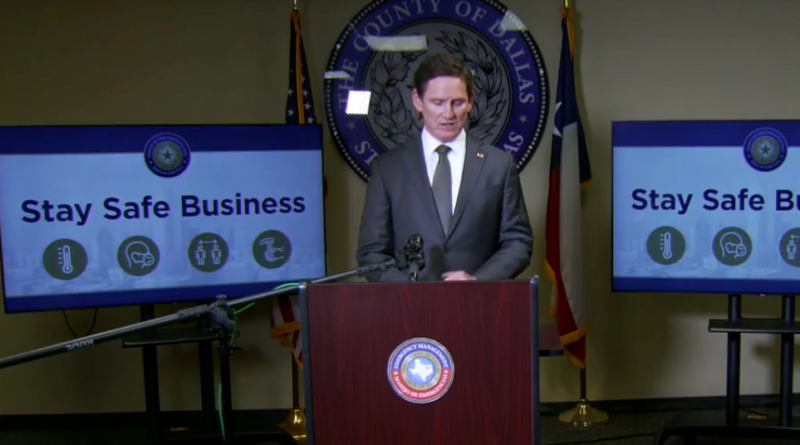New Voluntary County Program Still Draws Abbott’s Ire
More businesses will be given the green light to open soon, and others that are open now may be allowed to expand their capacity from 25% to 50% – but it’s still unknown how safe it is to do so. As county and state officials hash that out, we have your bullet points for today:
- New voluntary county program still draws Abbott’s ire
- New county cases continue slight decline
- Abbott announces federal funding for family violence centers
- Medical City says ‘thank you’ for the thank yous
- Townview students provide your moment of zen
New Voluntary County Program Still Draws Abbott’s Ire
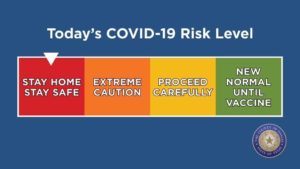 After Texas Attorney General Ken Paxton wrote letters Tuesday to officials with Travis, Bexar, and Dallas counties, as well as the mayors of San Antonio and Austin, warning them against making rules that went beyond what Gov. Greg Abbott has outlined, Dallas County Judge Clay Jenkins seemed exasperated.
After Texas Attorney General Ken Paxton wrote letters Tuesday to officials with Travis, Bexar, and Dallas counties, as well as the mayors of San Antonio and Austin, warning them against making rules that went beyond what Gov. Greg Abbott has outlined, Dallas County Judge Clay Jenkins seemed exasperated.
“We intentionally modeled the public health guidelines based on the governor’s recommendations, never imagining he did not want his own guidelines followed,” he said. “I ask the public to make decisions based on the recommendations of public health professionals: our lives depend on it.”
By Thursday, Jenkins met with reporters to roll out a new initiative designed to give the public the ability to decide – if they chose – to reward businesses who took pains to abide by Abbott’s guidelines with their dollars.
“Understandably, the businesses here were concerned that a few businesses who wouldn’t follow safe practices might mess it up for all of them,” Jenkins explained.
“What the attorney general has effectively done is he’s made it very hard to have requirements, to actually require people follow what the governor says he wants them to do,” he added. “So it’s kind of like I’m saying, ‘I want you to do something but I don’t necessarily care whether you do it or not.'”
Dubbed “Stay Safe Business,” the program provides businesses who agree to abide by guidelines set out for their particular industry a special designation from the county that serves as a signal to consumers.
Depending on where their business falls on the county’s color-coded recommendation chart, businesses could be open and operating to varying degrees.
Businesses who promise to follow guidance from health officials on distancing and operating safely, as well as follow the color-coded guide, would be able to display a “Stay Safe Business” insignia in their windows.
Jenkins stressed participation was completely voluntary, and there was no penalty assessed by the county for not participating.
“Being a stay safe business is a voluntary thing,” he said. “I think what will happen, of course, is patrons will look to see what businesses are safe.”
Jenkins also said that most businesses were already policing each other when it came to best practices, and that by and large, the business community was trying to keep customers and staff safe.
The county is in the “red” zone, meaning there is a high risk of community spread of COVID-19. To move to the next level – orange – the county would need to report 14 days of decline in ICU admissions, occupied hospital beds, and ER visits, among other metrics.
In an interview on Fox4, Abbott took exception to Jenkins’s characterization of the situation.
“You know, this is really simple,” he said. “Once again, Judge Jenkins gets it wrong.
“As Judge Jenkins knows, it’s clear that there are monetary fines available and there are licenses that can be revoked if people do not comply.”
New Cases Continue Slight Decline
Dallas County health officials reported 235 new cases of COVID-19 Thursday, bringing the total case count to 6,837, including a total of 159 deaths.
There were six new deaths reported, including a man in his 50s, a woman in her 60s, two men in their 60s, a man in his 90s, and a man in his 90s who had been a resident of a long-term care facility. All six were Dallas residents.
“Today’s numbers of positive cases are around the same level that we’ve seen for the last 10 days and today’s numbers of deaths, while significant and sad, still leave us on pace to have a less deadly week than last week,” Dallas County Judge Clay Jenkins said. “We are still in what the doctors consider to be the Red/Stay Home Stay Safe of the COVID-19 response, which means that you should stay home, avoid crowds, only frequent essential businesses that are absolute necessities and not wants, wear your face covering and maintain six-foot distancing when you are at these businesses or on public transportation, and use good hygiene.”
In his evening newsletter, Dallas Mayor Eric Johnson said that 25 hospitals reported their bed availability Thursday. Of the 5,713 total beds, 65% are occupied – which is up from the 61% we reported Monday. Of the 823 ICU beds available, 67% (or 554) are occupied, compared to the 547 last week, and 532 the weekend before. And 334 of the total 948 ventilators available are currently in use.
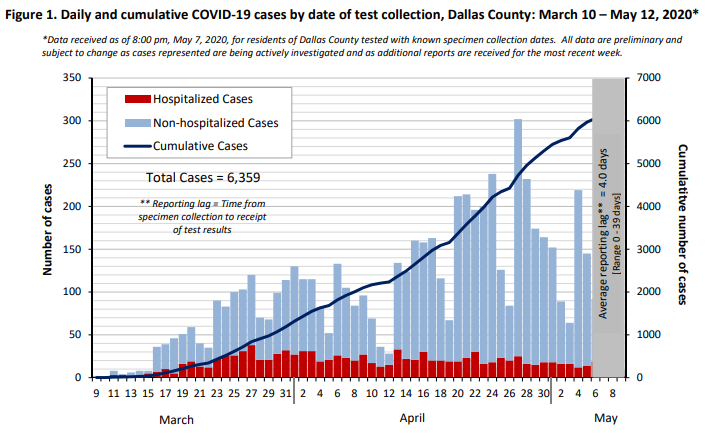
Of cases requiring hospitalization who reported employment, about 80% have been critical infrastructure workers including those in healthcare (18%), transportation (16%), food and agriculture – which includes grocery stores and places you can buy food (15%), public works (8%), finance (5%), communications (4%), teachers, real estate, and clergy (8%), and first responders (3%).
In the county’s May 12 aggregate report, most cases continue to be between the ages of 18 and 60, with the 18-40 age group accounting for 39% of the cases, and the 41-64 age group accounting for 42% of the total cases.
There were 3,104 men who were diagnosed with the novel coronavirus (or roughly 54%) and 2,675 women.
Close contact or community transmission continues to be the biggest risk factor for contracting COVID-19, accounting for roughly 84.3% of all cases. Living in a long-term care facility, being incarcerated in the county jail, and domestic travel are a distant second, third, and fourth, at 6%, 4.6%, and 2.3%, respectively.
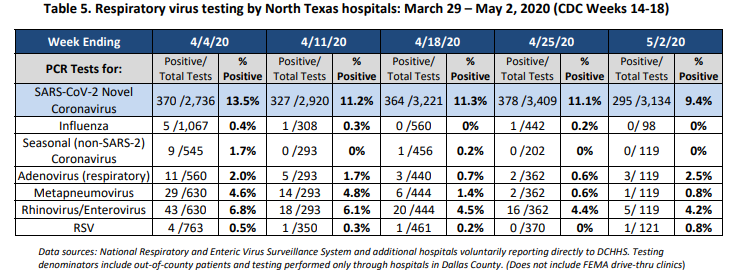
Of the testing done, positive cases accounted for 9.4% as of May 2, with 295 positives coming from 3,134 tests. However, testing and positive test results of COVID-19 far outpaces any other respiratory virus – even if you combine them all.
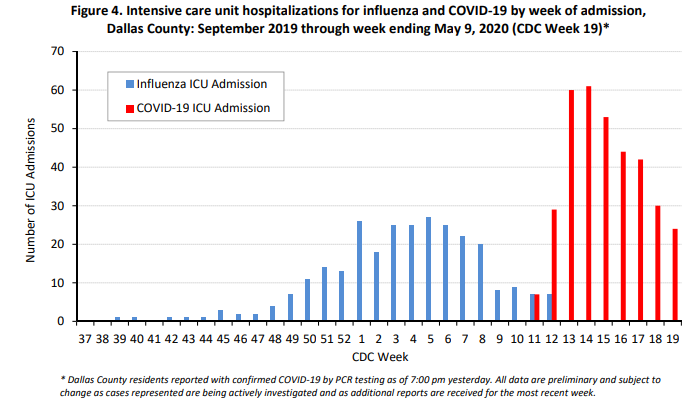
Hospitalizations because of COVID-19 have also eclipsed influenza hospitalizations on a weekly basis, too, and have for some time. It likely won’t be long before total hospitalizations from COVID-19 will eclipse total flu hospitalizations, and ICU admissions and deaths already have eclipsed flu numbers.
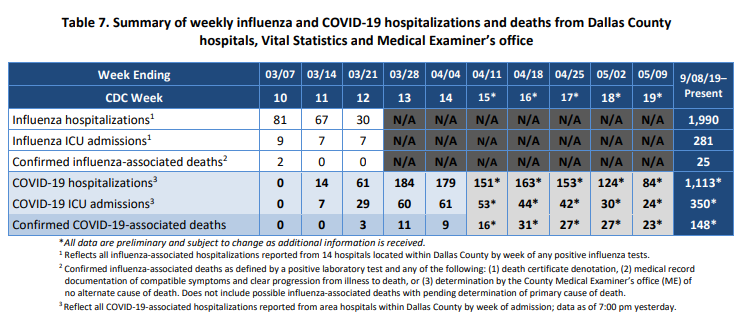
Eighteen percent of all cases ended up hospitalized – 31% ended up in critical care, and 19% ended up on a ventilator.
In a city-by-city breakdown, Dallas still comes in with the highest number of cases – 3,538, or 55.6%. Highland Park has 18 cases so far, and University Park has 25.
Abbott Announces Federal Funding for Family Violence Centers
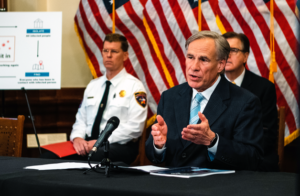 Gov. Greg Abbott Thursday announced the state Health and Human Services Commission received more than $3 million in federal funding to provide shelter and services to survivors of family and domestic violence during the COVID-19 pandemic.
Gov. Greg Abbott Thursday announced the state Health and Human Services Commission received more than $3 million in federal funding to provide shelter and services to survivors of family and domestic violence during the COVID-19 pandemic.
The funding, which was made available through the Coronavirus Aid, Relief, and Economic Security (or CARES) Act, will support 78 HHSC-funded local family violence centers that assist survivors with shelter, supportive services, and access to community-based programs.
“As we respond to COVID-19, the Lone Star State remains committed to supporting survivors of domestic and family violence and keeping Texans safe,” said Abbott. “I thank our federal partners at the U.S. Department of Health and Human Services for administering this funding to the state of Texas, and I am grateful to the organizations within HHSC’s Family Violence Program that continue to provide Texans with these crucial services.”
“The COVID-19 pandemic has presented challenging obstacles and uncertainty for many survivors of family violence across the state,” said Dee Budgewater, HHS deputy executive commissioner for Health, Developmental, and Independence Services. “This grant is a significant investment that will connect vulnerable Texans to critical services, shelter, and move them toward a life free of violence.”
This new funding will provide direct support to agencies, and will also help fund a range of supportive services including temporary 24-hour shelter, counseling, mobile advocacy, telehealth, peer support, rental assistance, and relocation expenses. The funding also assists family violence centers to cover the costs of providing remote services to those in need.
Medical City Says ‘Thank You’ for the Thank Yous
 We usually like to try to end these morning digests with something uplifting, and what’s more uplifting than gratitude?
We usually like to try to end these morning digests with something uplifting, and what’s more uplifting than gratitude?
As National Hospital Week winds to a close, Medical City Healthcare reached out to us with a thank you of their own from company president Erol Akdamar, who writes:
“This week, hospitals across the country and in North Texas celebrated National Hospital Week — an annual opportunity to recognize the incredible contributions of everyone who works in our hospitals and health systems. From information technology specialists, administrators, social workers and registrars to physicians, nurses, therapists, environmental services, and food and nutrition, we all work together to deliver the exceptional care our patients—our families—deserve.
While the word ‘unprecedented’ has certainly gotten a workout lately, it seems appropriate. I have seen firsthand the unprecedented efforts of our teams coming together to provide the best care possible to support our communities during this pandemic. North Texas hospital chief medical officers worked collaboratively to ensure our entire community had access to the latest data and best practices; IT departments worked to deploy technology to keep hospitalized patients connected to their families; and hundreds of clinicians stepped up to ensure that every patient received round-the-clock, expert care.
In turn, our communities have responded in unprecedented ways. We have been overwhelmed by the generosity of North Texans who have fed us, prayed for us, rallied around our facilities with flashing lights, and encouraged us in countless ways. Those messages of gratitude—sometimes colored in crayon—as well as donations of masks and meals and other acts of generosity, have been powerful fuel for our dedicated teams of physicians, nurses and colleagues. For us, this encouraging energy and kindness reaffirms that together, we can spread what this virus never intended: gratitude, hope and compassion.
During Hospital Week, as our community thanks us, we want to return that sentiment of gratitude for all of those who have provided incredible support for our healthcare heroes. Thank you.”
Townview Magnet Provides A Moment of Zen
Since it’s Friday, we hope you’ll indulge us a second uplifting ender – a postscript, if you will, in the form of Townview High School’s a cappella group, No Strings Attached, performing the James Bond Theme together, yet apart.

